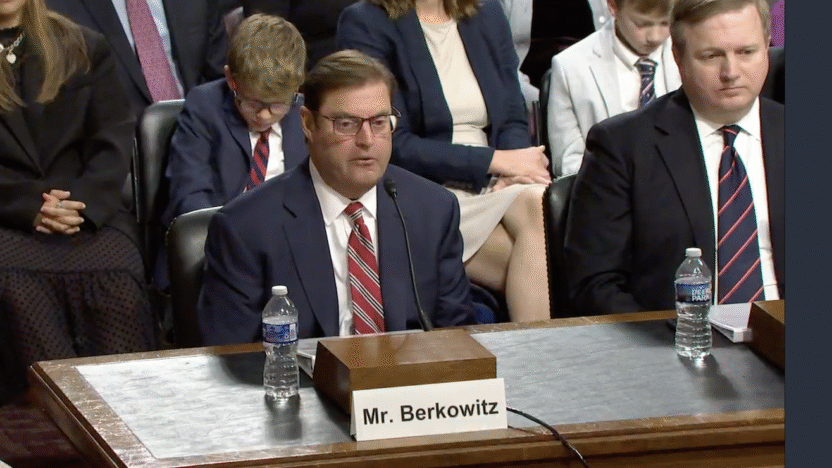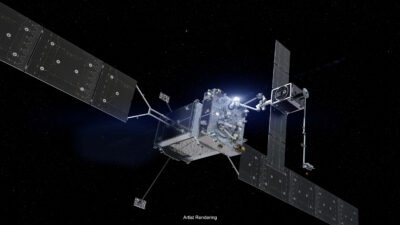WASHINGTON — Marc Berkowitz, a veteran space policy strategist nominated by President Donald Trump to serve as assistant secretary of defense for space policy, told lawmakers Oct. 28 that the United States should consider streamlining the management of national security space programs — potentially through tighter integration between the National Reconnaissance Office and the U.S. Space Force.
Testifying in a confirmation hearing before the Senate Armed Services Committee (SASC), Berkowitz said options to unify elements of the defense and intelligence space communities “should be worth considering,” arguing that closer integration of the National Reconnaissance Office (NRO) and the Space Force could improve efficiency in acquisition and operations.
Both the Space Force and the NRO build and operate satellites, the former for military missions and the latter for intelligence gathering.
Berkowitz, who previously served as assistant deputy undersecretary of defense for space policy and later as vice president for strategic planning at Lockheed Martin, has been an influential voice in debates over how the military organizes its space enterprise. In past writings, he has argued that inefficiencies persist despite the 2019 creation of the Space Force.
In a SpaceNews op-ed earlier this year, he wrote that the problem of “inefficient defense space acquisitions, one of the main concerns which prompted the U.S. Space Force’s creation, has not been resolved. The number of national security space acquisition organizations has increased, key defense space programs continue to be over budget and behind schedule, and satellite, ground and user equipment continue to be unsynchronized.”
At Tuesday’s hearing, Berkowitz appeared alongside other Pentagon nominees, including Joseph Jewell, the administration’s pick for assistant secretary of defense for science and technology. Portions of the hearing focused on the future of national security space programs and Trump’s proposed missile defense initiative known as Golden Dome.
Berkowitz said that, if confirmed, his top priorities would be to “sustain America’s position as the world’s leader in space activities … enable creation and operation of the Golden Dome for America comprehensive homeland missile defense, and strengthen U.S. space and missile defense forces to restore deterrence, achieve peace through strength, or, if necessary, prevail in conflict.”
Golden Dome, a still-conceptual program managed by Space Force Gen. Michael Guetlein, is envisioned as a multi-layered homeland defense system capable of detecting and intercepting ballistic, hypersonic and cruise missiles before or during flight. The system would rely on satellite constellations equipped with advanced sensors and potentially space-based interceptors.
Berkowitz told senators he expects to “work very closely and collaboratively with General Guetlein and all of the department’s components involved in the Golden Dome program, not only on sensors, which are a critical aspect of it, as well as potentially space based interceptors, but also on the battle management, command and control and communications capabilities that are essential to network all of the system of systems that will comprise the homeland missile defense.”
Jewell, meanwhile, said he would prioritize advancing research in space-based sensing and missile detection technologies. “We’re going to rely on some of those space based layers, as well as ground based layers, in order to execute the sensing and custody that we need prior to addressing in a kinetic fashion any threats that may face the homeland,” Jewell told the committee. “If confirmed, I intend to support research in space technology.”
In his opening remarks, Berkowitz emphasized that “unimpeded access and use of space is of vital national interest.” He warned that “the threat environment is extraordinarily complex,” pointing in particular to China’s growing counterspace and missile capabilities, which he said are designed “to undermine our historic advantages in space, contest our freedom of action, jeopardize our military forces and operations, and hold the U.S. homeland at risk.”
Challenges in space policy
He mentioned two core challenges he expects to confront if confirmed: “addressing the national security policy issues required to enable us to deal effectively and urgently with the pace, scope and complexity of space and missile threats, and the second is the broader national policy issues to sustain United States position as the world’s leader in space exploration and use.”
Lawmakers pressed Berkowitz on the question of balancing defense space activities with intelligence community programs. Sen. Jack Reed (D-R.I.), the committee’s ranking Democrat, asked whether Berkowitz believed the undersecretary of the Air Force should also serve as director of the NRO.
Berkowitz pushed back on the assertion that he had explicitly advocated for merging those positions but said he has floated various options for “improving the efficiency of the department’s space activities.”
He reminded senators that “throughout much of the history of the national security space program, either the secretary, undersecretary or assistant secretary for space in the Department of the Air Force was dual hatted as the director of the NRO, and for much of that time, both the defense and National Reconnaissance Office programs were run very efficiently and effectively. And so if that is an option that’s worth considering, I would support it, if it was appropriate.”
Sen. Angus King (I-Maine), the ranking member of the SASC subcommittee on strategic forces, endorsed the idea of reducing duplication across agencies. “We can’t afford to develop parallel space capabilities where there’s overlap and the cost involved is enormous,” King said. “I hope you will continue your provocative thinking.”




